The pursuit of hidden treasure has always been one of the most fascinating activities for mankind. People have long taken part in all sorts of pastimes trying to uncover the hidden wealth found underground.
While you may not go out into the seven seas in hunt of hidden gold and silver filled cases, you can enjoy the same thrill by taking part in the fascinating hunt for metals.
Metal detecting is an exciting hobby practiced by many people. Not only do metal hunters have a fun time in the field but some of the greatest contributions to history have come from the hunt.
For instance, one of the biggest Anglo-Saxon treasures with gold, silver, and valuable trinkets, called the Staffordshire hoard, was stumbled upon by a metal detectorist.
If you are looking for an engaging hobby of historical proportions then keep reading to find out more about metal detecting hobby.
Take up an exciting pastime searching for hidden treasure. Amazing online courses here!
What Is Metal Detecting?
You have probably already come across people with strange-looking machines, oddly concentrating on the sound of its beep. While it may look like some strange alien thing, there are no UFOs there. It’s simply the hunt for metals.
Metal detectorists are people who use metal detectors to uncover buried metal objects. These objects can range from precious things like lost earrings and old relics to trash like bottle caps and rusted nails.
Metal detecting can be done anywhere and even in water. Some do it to sell their finds while the majority are in it for the fun.
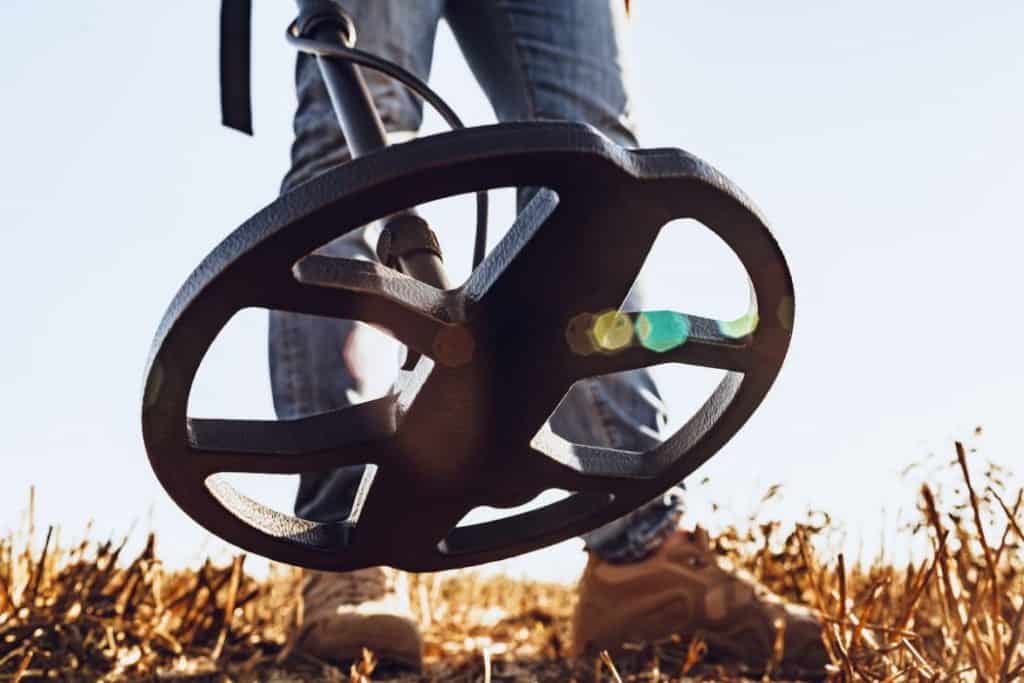
Why Is Metal Detecting A Great Hobby?
Hunting is fun
Metal detecting gives you the thrill of being able to discover something that was long forgotten. It’s a fun adventure and a great way to keep the adrenaline pumping.
Even if you don’t make historical finds. You are bound to pick up a valuable thing or two out there. It’s an exciting way to satisfy your curiosity.
Collectors treasure
Once you come across treasures you can make a significant collection. Some of the things you can dig up while metal detecting includes valuable coins and treasures.
So, it’s a great way to build a one-of-a-kind collection. Apart from that, you can actually build a lucrative collection of real treasures.
Outdoor exercise
Metal detecting is a fun way to spend time outdoors connecting with nature and getting some good exercise. It helps you to stay fit and healthy.
Can be lucrative
If you land some interesting finds like lost jewelry you can sell it and make some good money. Also, some of the treasures out there are old and rare which makes them extremely valuable.
It’s an ageless hobby
Kids, grown-ups, and even the elderly can all take part in metal detection and have fun while doing it.
Historical findings
The history of people and their treasures is both intriguing and at times incredible. Now imagine if you could unearth hidden treasures from periods in the past.
It would be great to make discoveries of coins, jewelry, and metal objects that have a deep connection with history.
Metal detecting is an exciting way to unravel history. Besides, who doesn’t want their name in the papers?
Always get permission before digging on anyones property
Exploration
One of the great things about metal detecting is that you will not only find treasures and many other hidden things, but you’ll also be exploring the land in the process.
You get to know more about your area and the different landmarks making you an expert of sorts, even places that you would not normally just take a stroll.
It’s an adventure waiting to happen. All in all, a metal detecting hobby is great fun and an all-around adventure.
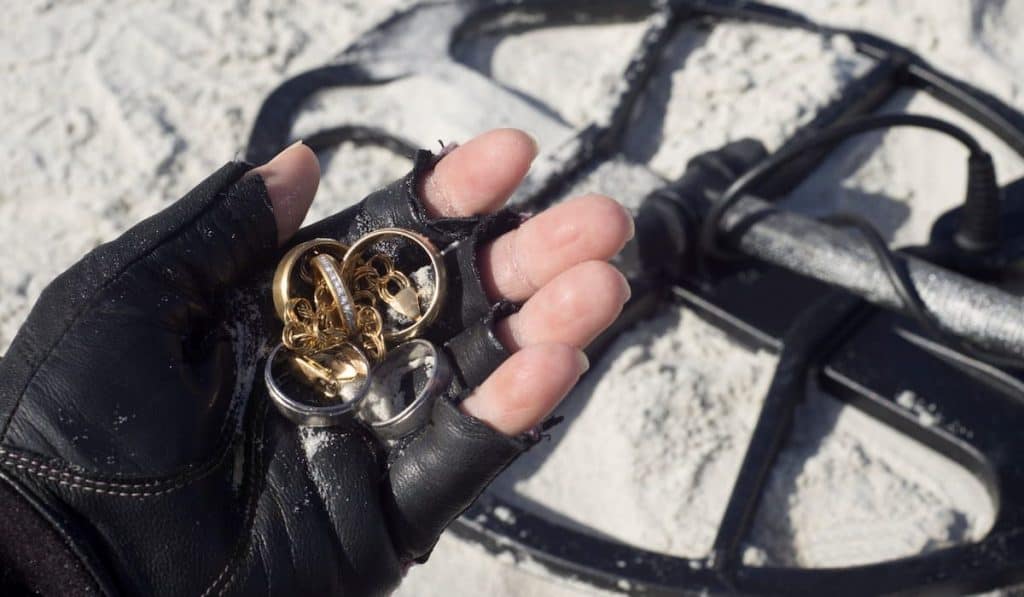
Do I Need Any Special Tools for Metal Detecting?
You can’t go metal detecting without a metal detector, can you? It’s the most important tool you will need to get started.
There are different types of metal detectors available. Each one will work differently from the other. When you go out to buy your metal detector there are a few settings you will want to check out. These are;
Sensitivity
The more sensitive a detector is, the more it can find. Thus, you will want to see just how sensitive a particular brand is before you buy. But a word to the wise, too high a sensitivity is not what you want to go for. Why? Because if it’s too sensitive it will ping all the time even for all sorts of rubbish.
Detection mode
You will also want to check the detection mode settings before you buy. You see, metal detectors can be set to detect different materials. Therefore, the more desirable machine for you is one that can detect a wide range of metals.
Remember to do a lot of research before you commit to a metal detector.
Go over a few reviews, ask other metal detectors, and search the internet for opinions. Opt for a good price, remember the more expensive the more likely it is to have better features.
Having said that, you should also know that there’s no good metal detector. What’s good for one person might not be the best for the other.
All metal detectors will have different features from the basic to the most advanced.
It’s not just about looking out for the price. Make sure you look into the reviews to see what works best in your area and for the type of treasure you want to go after.
Metal Detectors Tool Bag Must-Haves
Besides the obvious metal detector, you need some other things as well. Here are some must-haves to take with you when you go out looking for treasure.
Strong gloves
What’s the fun in uncovering hidden treasures if you don’t do a bit of digging? You will require to have a good pair of gloves to protect your hands from stones and sharp objects in the dirt. Getting hurt may put you off your hobby so don’t skimp on the cost when it comes to the best quality gloves.
Digging tools
Your hands can only dig so far. You need good digging tools like a small shovel we use the Prospector tool
or a trowel and scoops to dig out your finds carefully. Using the right tools will save you time and ensure you extract your finds as easily as possible.Headphones
It will be hard to hear the beep of the machine over sounds and loud voices. So, depending on where you choose to metal hunt, a good pair of headphones is a must-have. If you can, noise-canceling headphones will be best. But any type will do either way.
Protection from the elements
Since you’ll be spending a lot of time outdoors, you will need to protect yourself from harsh weather. Sunscreen, repellant, and a good hat for hot or chilly weather will come to your aid when you brave the elements.
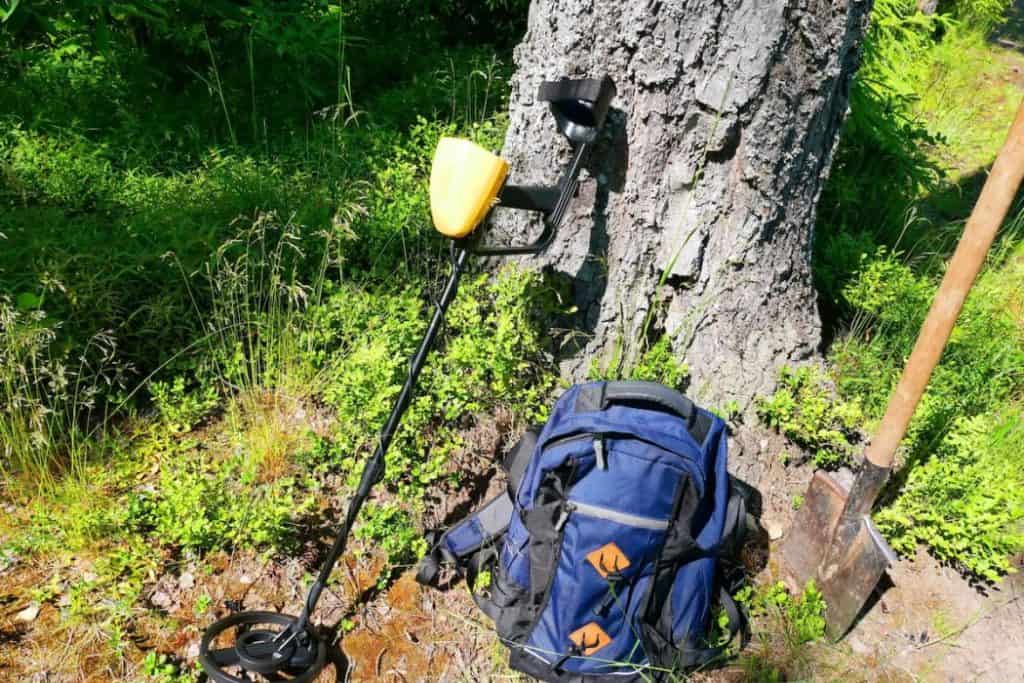
These are the must-have tools you will need in the field. There are also some nice to haves which you don’t necessarily need to buy but can come in handy.
For instance, a pinpointer is a small secondary detector to help you pinpoint your finds once you have done a little of the digging. Other nice to have tools include pouches, carry bags, and towels.
It’s important to note though, that you don’t have to splurge on tools and expensive stuff before you decide you are hooked. Once you fall in love with the hobby (and you will) you can add more stuff to your metal detecting tool bag.
Tips for Getting Started in Your Metal Detecting Hobby
Know where to hunt
Depending on what you are looking to find, a good first step would be to choose a hunting location.
If you are more interested in finding lost jewelry and trinkets, you can start by hunting in places where many people visit. For example, you can go to the beach, campsites, or resort land. Chances are you will find a lot of forgotten trinkets there.
On the other hand, if your fixation is with finding lost treasures, then historical landmarks and old sites are a good place to start. For instance, you can look for fields or abandoned sites that have a rich connection to history.
Find new hunting ground
Metal detecting is an interesting adventure. But if you go somewhere where so many other hunters have already gone, chances are high that you won’t find anything. So, your best bet is to try and find less frequented areas where you can get the good stuff.
If you have no options for new places to go, focus on places that get high traffic of people like the beach.
Here are some options for places you can go hunting.
- Schools
- Nearby beaches
- Private property
- Churchyard
Do your homework
Put in your research first before you decide to hunt in any area. This should give you an idea of what you expect to find there. You will be pretty frustrated if you spend the whole day whooshing your metal detector with nothing to show for it.
More especially if you are interested in historical findings, research is the key to making great finds.
Firstly, you can scour the internet for possible lost treasures. Look at websites that talk about the history of the hunting zone where you want to go.
Another option would be to visit the library and brush up on your history. You can also look at old maps. Once you pinpoint some areas on the old map, you can cross-reference these to a current google map, and then you’ll know where to go.
Make sure to ask the librarian because some of those old maps might not be on public display. However, they’ll be happy to allow you access to them if you ask.
If you know the history of a particular area it will help you to have an idea of the findings.
You can also find a tool such as Historic Aerials. This great resource comes in handy when you want to integrate an old map with a new one. You are able to see how things were back then and at the same time find the spot on your modern map.
So, for example, you can use it to view a map of your house in the present day and as it was 100 years ago. This assists you to fine-tune your search. You will have an exact idea of where to start.
Furthermore, you’ll get more out of a focused search than going about it randomly.
A fourth option is history societies where you can get important sources of information. Simply get in touch with them and they will link you up with lots of resources you can access.
What’s more, the people there will be history buffs. They will probably know a lot about historical places and events.
Microfilm is also an additional useful tool that can help you to pinpoint some important finds. Your local library should have some that you can go through.
One of the best ways of learning about the past is by talking to people who may have been there or had a first-hand account. Engage some old-timers as they’ll have lots of great stories for you and you can rely on them to find some useful information
Finally, you can get a subscription to metal hunting magazines. Here are some good picks:
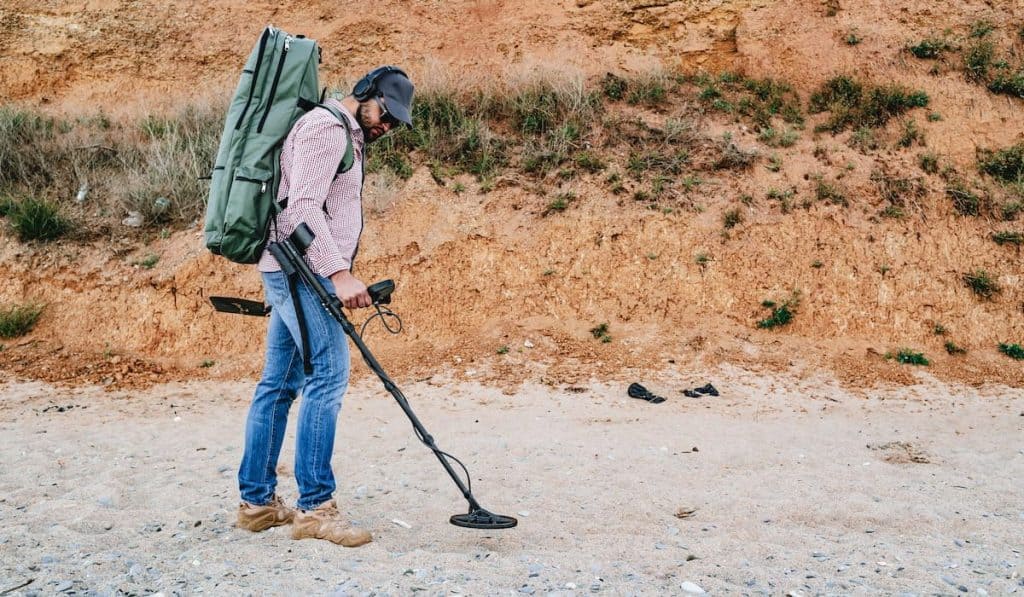
Get permission
You are not allowed to just go zooming your metal detector wherever you please. Otherwise, you could get fined for breaking the law, trespassing, or worse still you’ll be banned from some places for good.
That’s why it’s important to find out if there are any legal restrictions on your hunting ground. For private property, you will have to ask the owner if they are okay with you detecting metals on their grounds. They might not be opposed to it, but it’s always best to ask.
For public property, you will need to seek permission from the authorities like your local government. Get it in writing also, so you can show law enforcers in case you run into a problem.
Note, metal detecting in most federal parks is forbidden so it’s best to steer away from these.
Be responsible
Detectorists don’t just dig, but they also fill up which is the responsible thing to do. When you find something don’t be so overjoyed you forget to cover up holes. As a rule of thumb, fill up where you dig up. You need to maintain the land as you found it.
Not only is this best for the environment, but it also ensures that you and other metal finding hobbyists are allowed to keep doing it.
Imagine what would happen if everyone just went around digging holes on people’s grounds? Metal detecting would be outlawed, that’s what. So again, fill up where you dig up.
Not only that but also remove any other trash you dug out and dispose of it responsibly. Sure it’s not yours, but if you leave things lying around you are going to mess things up for yourself and other detectorists.
Another big part of being responsible is using the right tools. Digging tools that destroy the surface are a big no-no. There’s no reason to rush anyway. Use the recommended small tools that don’t disturb the ground too much.
Be patient
You are going to dig up a lot of trash before you find any treasure. Getting the perfect settings on your detector to filter out all the rubbish is going to take a bit of time. Remember the more you go out on the hunt the higher your chances of finding something. So don’t be discouraged by a few bottle tops.
Be safe
Everyone who sees you with a metal detector will probably assume you got a hold of some valuable treasure. Even if all you came across is a few metal scraps. Therefore, you must be very keen.
On the subject of safety, be careful to watch out for property lines and signs especially if you’re hunting in the woods. If you’re out in the woods alone people are going to think you’re an intruder. Therefore, you should ensure you’re not roaming about on private property.
Comply with the law
Because you are hunting for valuable things, sometimes even of extreme historical importance, it’s essential to follow the law on findings and relics. When you make a finding of historical significance you will have to hand it over to the authorities. Resist the temptation of keeping it to yourself.
But I found it!
I hear you but, no, finders’ keepers won’t work on historical artifacts.
Don’t clean
To preserve your findings, the basic rule is if in doubt don’t clean. Some of the stuff you’ll find is old but extremely valuable so using any harsh chemicals may damage and reduce its value. If you ever want to make a few bucks from your hobby you’ll want to keep all your findings intact.
Switch it up
If you combed over one area and found nothing, there’s no point in going back the next day. You’d rather switch things up by changing places now and again. If you went to the beach, then try the woods the next day and back to the beach the following month.
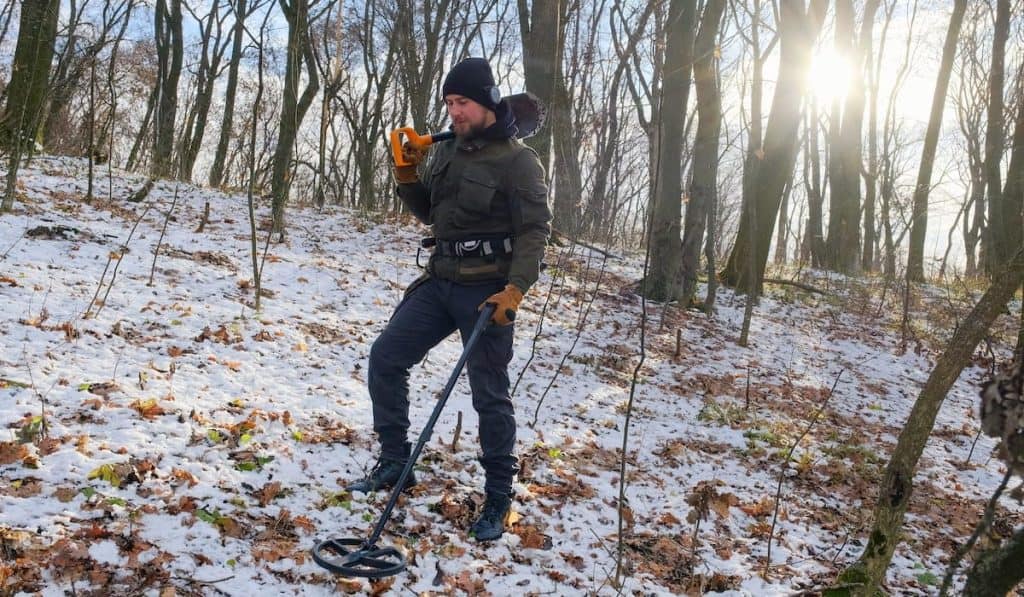
Get on with Your Metal Detecting Hobby
Now that you know what to do, it’s time to get cracking. But before you do, start with a little practice run in your backyard. Bury a few metal pieces (think forks and spoons, not your gold ring!) Now use your metal detector to try and find them. Practice a few digging techniques to get the hang of how to handle yourself in the field.
Once you get that into your system, now the best part begins. Do your research and go out hunting.
Here’s what you should remember when you are outdoors:
Detector position
There’s a right and wrong way to hold the metal detector. It’s not rocket science but if you do it the wrong way you are not going to get any pings. So, make sure you are holding it at the correct angle and the coils are facing the right way.
Take your time
Stroll over an area, you’ll miss some good things if you hurriedly zoom past. Slowly move your detector on the area you are scouring.
Remember to listen to the pings on your detector. They will come in varying tones and pitches. These may be confusing to you at first but not to worry you will soon get the hang of it.
To Summarize
Metal detecting is a great hobby – no doubt about that. Once you get the hang of it, you might find it a tad addictive.
Getting started has never been easier, just get yourself some basic equipment, research a few areas and get digging.
Don’t worry if you don’t have it all figured out, you’ll get by with trial and error until you learn the ropes.
Remember to be a responsible detectorist. Leave the area as you found it and always follow the law.
Now that you are up to speed with all you need to know about metal detecting, it’s time to dive in. Enjoy!
- 7 Easy Domino Games
- 31 Card Games You Can Play With a Single Deck of Cards
- 70 Easy Party Games
- 48 Outdoor Game Ideas for Kids
- 9 Hobbies Related to Science




